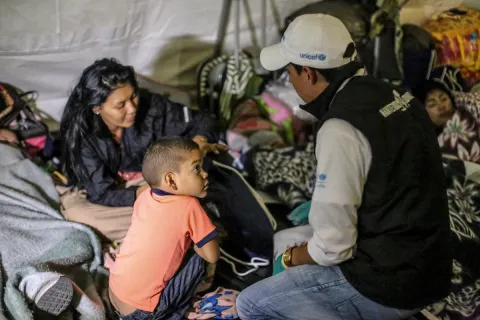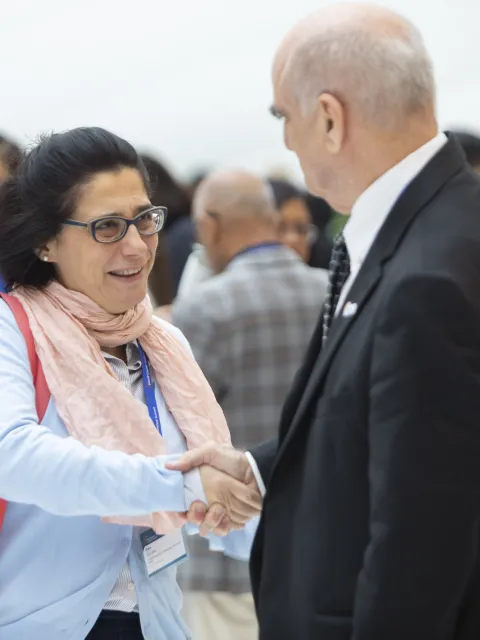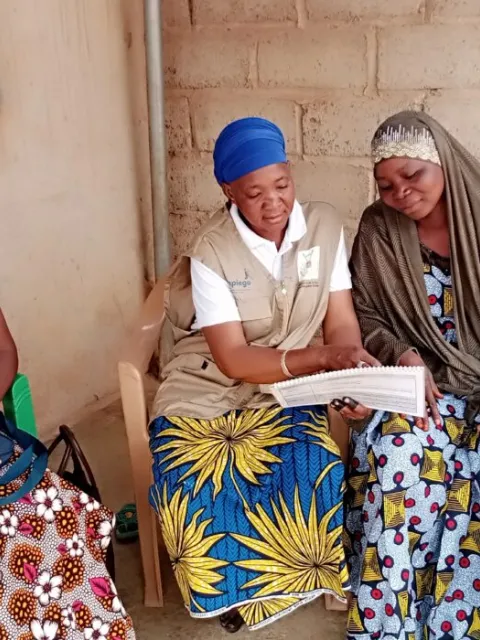Cancer and social unrest: caring for Venezuelan migrants in Colombia
Marking World Refugee Day, UICC starts a series of articles spotlighting members dispensing cancer care to people displaced by conflict or social instability in their region.

Over six million Venezuelans have left their country in recent years due to political and social turmoil that has generated hyperinflation, violence and shortages of food, clean water, electricity and medicines. The COVID-19 pandemic has only compounded what has now become the second-largest external displacement crisis in the world after Syria.
Over one quarter of these displaced people, about 1.7 million, are estimated to be based in Colombia, according to the most recently available World Bank estimates. While the situation inevitably has the potential to strain the country’s infrastructure, the government should be lauded for its open policy and management of migrants: issuing permits and legal status, investing in host and migrant communities, reunifying families and extending social, education and health programmes to migrant populations.
Colombia implemented mandatory universal health insurance almost 30 years ago and now some 95% of Colombians have access to basic health services, including cancer care. “At least, that is in theory,” says Dr Carlos José Castro Espinosa, Medical Director at the Liga Colombiana Contra el Cáncer (Colombian League Against Cancer) and former General Director of the Colombia National Cancer Institute (OVTT).
“There are, in fact, significant cultural and developmental differences in health provision between the urban centres like Bogotà and the rural Amazon region or between the Atlantic and Pacific coasts. Local community clinics often don’t have the infrastructure to address many health issues. Furthermore, there are significant differences between the care provided through the national insurance scheme and private insurance. A woman with a lump in her breast and diagnosed with cancer may wait 30 days for treatment if she has private insurance – but up to 120 days if not. There is still a lot of inequity.”
– Dr Carlos José Castro Espinosa, Medical Director at the Colombian League Against Cancer
In Venezuela, the situation for people living with cancer is critical. According to César Miranda, Manager of Education and Prevention at the Sociedad Anticancerosa de Venezuela (Anti-cancer Society of Venezuela), the country suffers from a severe shortage of professional staff and medical equipment.
22 radiotherapy units have been closed in the last five years, leaving only one functioning for breast cancer, and chemotherapy suffers from shortages of drugs throughout the country. More than 25 medicines needed for breast cancer treatment are not available in the pharmacies of the Venezuelan Social Security Institute (IVSS).
In addition, many health professionals are among those leaving the country. As a result some hospitals have stopped performing surgeries and even suspended regular medical consultations.
For some types of cancers such as breast, cervical and prostate that can otherwise be well treated in the early stages, patients are experiencing delays, of up to a year to start treatment.
"With no public health facilities available, patients in Venezuela must migrate to private health centres, where costs can reach USD 10,000. The current minimum wage in the country is 126 bolivares (USD 28). What we need is to raise awareness and oblige the State to guarantee the right to health. A law should be created to protect oncology patients, as has been done in other Latin American countries."
– César Miranda, Manager of Education and Prevention at the Sociedad Anticancerosa de Venezuela
Venezuelans migrating to Colombia who are in possession of a work or stay permit have access to the same free basic health services through the national health insurance scheme as Colombians. This includes routine screening (such as mammograms every two years for women aged 50 to 69) and vaccinations for children, as well as treatment and care for those diagnosed with cancer.
“In reality, many populations, including migrants who are among the more vulnerable, lack real access to services. This can be due to geographical location or lack of information and awareness, either about cancer risks or available services.”
– Dr Carlos José Castro Espinosa, Medical Director at the Colombian League Against Cancer
Dr Castro Espinosa says that, while most Colombians support the government’s open policy to extend free education, health and other social benefits for migrants, some feel that there has been a rise in insecurity and other problems. “This is wrong,” says Dr Castro Espinosa. “Our problems are not caused by migrants, we have had violence for centuries. Regardless of their situation, these people are human beings and we need to treat them well.”
He cited, however, the case of Venezuelans who cross the border for the treatment due to lack of services or medication in Venezuela but are not leaving the country or do not have proper documentation – and therefore cannot receive care. “I met at the Liga with a woman with breast cancer who came to Colombia because she could not find medicines and receive treatment in Venezuela. But she did not have any official papers, she was not registered in the system, so unfortunately we could not help her,” Dr Castro Espinosa explained.
Furthermore, after meeting recently with the Ministry of Health, Dr Castro Espinosa learned that there was very little data concerning cancer cases among displaced populations. Documented migrants benefit from free health coverage for cancer care but precise numbers regarding people from Venezuela living with cancer and requiring treatment remain unknown.
“Everyone talks about migrants but few institutions are actually looking at how many are being cared for, how and by whom. Colombia receives money from the international community but we are not sure how much goes to cover health. If there is a problem, we have to look for opportunities to address it, not ignore it. I’m not saying that public authorities are not interested, but it is concerning that they are not looking at this problem,” says Dr Castro Espinosa.
In the coming months, the Liga Contra El Cancer aims to pursue its outreach with the Ministry of Health and other organisations to learn more about the number and needs of people with cancer from Venezuela who are living in Colombia. In the mean time, Dr Castro Espinosa says, “we will continue to treat as best we can those who come in for care.”
Read our articles on cancer in zones of unrest and listen to a podcast on the topic with Prof. Richard Sullivan, Professor, Cancer & Global Health at Kings College London, who will also be speaking at the upcoming World Cancer Congress in Geneva, 18-20 October.
Last update
Monday 08 August 2022
